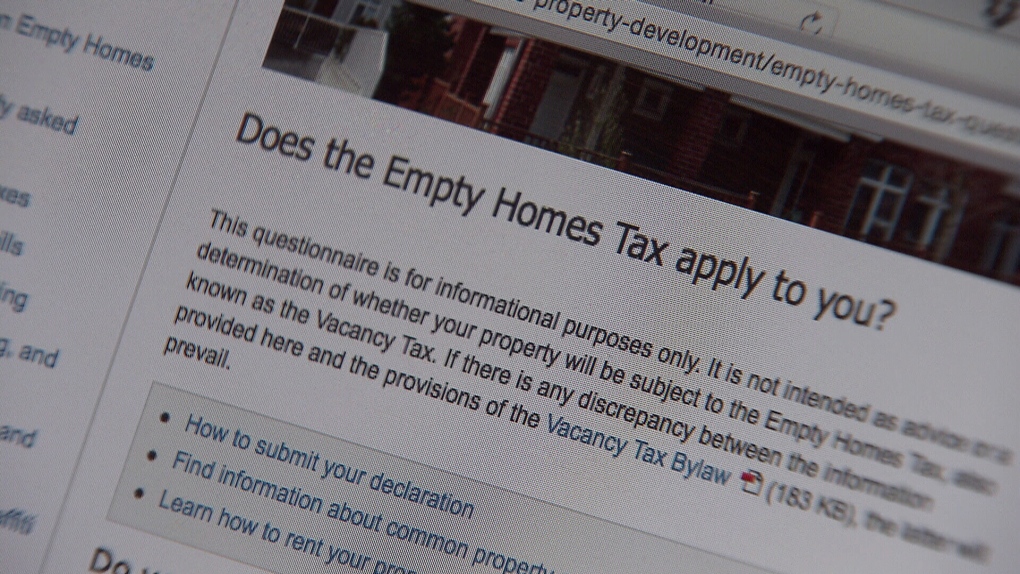Vancouver's Empty Homes Tax was set to increase in 2023. That may not happen after all.

Vancouver city council is set to consider a recommendation to freeze the rate of the Empty Homes Tax rather than proceed with a planned increase.
A report from city staff coming to council Wednesday says that the rate was set to increase from three per cent of a property's assessed value to five percent for this year. Because empty homes declarations are not due until November of 2023, the new rate has not yet "been levied in any instance," a memo to council notes.
The impact of the increase may, the report to council says, "support further conversion of additional homes from empty to occupied." However, it may also "result in a higher risk of tax evasion and consequently, requiring more resources for performing compliance work and increased impact of unintended consequences," according to staff.
The recommendation comes after staff undertook a review of the "fairness and effectiveness" of the current regime, the report says.
Introduced in 2017, the goal of the Empty Homes Tax was to reduce the number of vacant properties as one way of addressing the housing and affordability crises. Initially imposed at one per cent, the tax has generated $115.3 million in revenue to be used to fund housing and supports for renters.
The rate increased to three per cent in 2021 and staff was directed to examine the impact of this increase and report back with observations and recommendations. In 2021, 160 fewer homes were declared vacant compared to the previous year. In 2022, there were an additional 130. That works out, according to the report, to a 20 per cent annual decrease.
However, the report says the timing of the tax increase makes it difficult to isolate its impact from the broader economic and social upheaval of the COVID-19 pandemic.
In addition to halting the hike, staff are also asking council to approve several new exemptions to the tax. Those include vacancies that are due to disaster or hazardous conditions and vacancies caused if people have had to move to a secondary residence to receive medical treatment.
An exemption for condos that have been built but not yet sold is also on the table.
OneCity Coun. Christine Boyle has already come out in opposition to the tax freeze and the exemption for newly built condos.
She notes that renters in Vancouver are still navigating a market characterized by the lowest vacancy rates and highest prices in the country. While higher interest rates had a bit of a cooling effect on the city's housing market, home ownership in Vancouver remains out of reach for many.
"Vancouver suffers from a crippling shortage of every type of housing. Cutting the empty homes tax would be cutting the owner of every pied-a-terre, cottage, vacation home and empty investment property a sweetheart deal," she said in a statement.
"That would be a major step backward in our work to address Vancouver’s affordable housing crisis.”
Council is scheduled to consider the report and its recommendations at a meeting starting at 9:30 a.m. Wednesday.
CTVNews.ca Top Stories

Walking pneumonia is surging in Canada. Is it peaking now?
CTVNews.ca spoke with various medical experts to find out the latest situation with the typically mild walking pneumonia in their area and whether parents should be worried.
Whole Foods carrots pulled in expanded recall for E. coli: CFIA
The Canadian Food Inspection Agency has announced an expanded recall on carrots over risks of E. coli O121 contamination, according to a notice issued Friday.
Prime Minister Trudeau attends Taylor Swift's Eras Tour in Toronto with family
Prime Minister Justin Trudeau is a Swiftie. His office confirmed to CTV News Toronto that he and members of his family are attending the penultimate show of Taylor Swift's 'The Eras Tour' in Toronto on Friday evening.
Afraid of losing the U.S.-Canada trade pact, Mexico alters its laws and removes Chinese parts
Mexico has been taking a bashing lately for allegedly serving as a conduit for Chinese parts and products into North America, and officials here are afraid a re-elected Donald Trump or politically struggling Prime Minister Justin Trudeau could try to leave their country out of the U.S.-Mexico-Canada free trade agreement.
Even with access to blockbuster obesity drugs, some people don't lose weight
Unlike scores of people who scrambled for the blockbuster drugs Ozempic and Wegovy to lose weight in recent years, Danielle Griffin had no trouble getting them.
NEW Thinking about taking an 'adult gap year'? Here's what experts say you should know
Canadian employees are developing an appetite for an 'adult gap year': a meaningful break later in life to refocus, refresh and indulge in something outside their daily routine, according to experts.
UN talks in disarray as a rough draft deal for climate cash is rejected by developing nations
As nerves frayed and the clock ticked, negotiators from rich and poor nations were huddled in one room Saturday during overtime United Nations climate talks to try to hash out an elusive deal on money for developing countries to curb and adapt to climate change.
The Thriftmas Special: The benefits of second-hand holiday shopping
The holidays may be a time for family, joy and togetherness, but they can also be hard on the wallet.
'Her shoe got sucked into the escalator': Toronto family warns of potential risk of wearing Crocs
A Toronto family is speaking out after their 10-year-old daughter's Crocs got stuck in an escalator, ripping the entire toe area of the clog off.

































